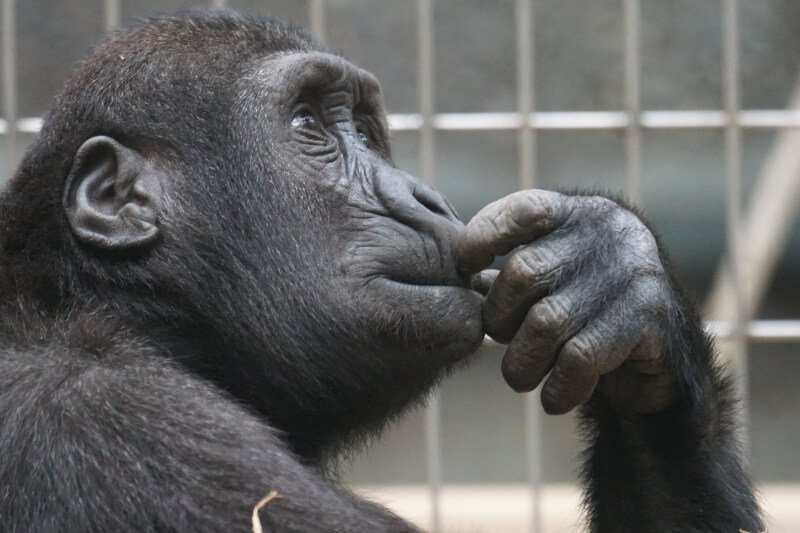In this article, you will discover the importance of creating a supportive environment for primates and how meeting their social needs can greatly impact their overall well-being. By understanding the social dynamics that primates naturally thrive in and implementing strategies to recreate these dynamics, we can ensure that primates in captivity are given the opportunity to live fulfilling and enriched lives. From providing opportunities for social interactions to promoting natural group structures, this article will explore the various ways in which we can enhance the social lives of primates, ultimately contributing to their overall happiness and quality of life.

Understanding Primate Social Needs
Primates are highly social animals that rely on social interactions for their overall well-being. Understanding and addressing their social needs is essential in providing them with a supportive environment. Social interaction plays a crucial role in the mental and emotional health of primates, and the lack of it can lead to increased stress and behavioral issues. By recognizing the importance of social interaction, different types of social structures in primates, and the role of social bonds in their well-being, we can create an environment that promotes their overall happiness and mental stimulation.
The importance of social interaction
Social interaction is a fundamental aspect of a primate’s life. It helps them form and maintain social bonds, communicate with others, and establish hierarchy within their social groups. Primates engage in various social behaviors such as grooming, playing, and vocal and visual communication, all of which are vital for their mental and emotional development. Social interaction also provides enrichment and stimulation, allowing them to express their natural behaviors and fulfill their social needs.
Different types of social structures in primates
Primates exhibit a wide range of social structures, varying from solitary to highly complex group dynamics. Some primates, like orangutans and some species of lemurs, are predominantly solitary, while others, such as chimpanzees and baboons, live in complex social groups. These social groups can consist of multiple individuals, often with a hierarchical structure. Understanding the social structure of a particular primate species is crucial in providing them with appropriate social groupings that align with their natural behavior and preferences.
The role of social bonds in primate well-being
Social bonds play a vital role in the overall well-being of primates. These bonds are formed through social interactions, such as grooming, playing, and supporting one another. They provide a sense of security, belonging, and emotional support. Primate social bonds contribute to reduced stress levels, increased social cohesion, and enhanced overall health. By promoting the formation and maintenance of strong social bonds, we can ensure the well-being of primates in our care.

Providing Social Groupings
One of the key aspects of meeting primate social needs is matching them with compatible social companions. Primates thrive when they are in the company of individuals they get along with. By carefully considering their personalities, social dynamics, and hierarchy, we can create social groupings that foster positive social interactions and reduce the likelihood of conflicts.
Understanding group dynamics and hierarchy is essential in maintaining harmonious social groupings. Primates live in hierarchical societies, where individuals have distinct roles and positions within the group. By recognizing and respecting these hierarchy structures, we can ensure a stable and secure environment for the primates in our care. This also involves monitoring for any signs of aggression or dominance displays and addressing them promptly to maintain a peaceful social atmosphere.
Creating diverse social groupings is also essential in providing a stimulating and enriching environment for primates. Introducing individuals from different backgrounds, ages, and genders can enhance their social experiences and promote mental stimulation. By carefully selecting individuals for social groups and periodically evaluating their compatibility, we can ensure that primates have a variety of social interactions to engage in.
Encouraging Socialization Opportunities
Designing spacious enclosures is crucial in promoting social interaction among primates. Sufficient space allows them to move freely, engage in physical activities, and explore their surroundings. By providing ample room, primates can have the opportunity to socialize with others without feeling confined or restricted. Spacious enclosures also reduce the likelihood of conflicts arising due to resource competition or territorial disputes.
In addition to spacious enclosures, providing engaging stimuli for social interaction is essential. Enrichment items such as ropes, hammocks, and climbing structures encourage primates to engage in social play and physical activities. These stimuli not only provide entertainment but also promote the development of social bonds among individuals. By regularly updating and diversifying enrichment items, we can ensure that primates have a continuous source of mental and physical stimulation.
Organizing supervised play sessions is another effective way to encourage socialization opportunities. These sessions involve structured and monitored interactions between compatible individuals. Trained staff members closely observe the interactions to ensure the safety and well-being of all participants. Supervised play sessions provide a controlled environment for primates to engage in social behaviors and develop their social skills.

Promoting Communication and Enrichment
Facilitating vocal and visual communication is essential for promoting social interaction among primates. These communication methods are integral in conveying information, expressing emotions, and establishing social bonds. By designing enclosures that allow for visibility and auditory communication between individuals, we can encourage these natural forms of interaction.
Offering opportunities for grooming and physical contact is also crucial for primate socialization. Grooming plays a significant role in primate interactions, as it helps maintain hygiene, strengthen social bonds, and reduce stress levels. Providing access to grooming partners and enabling physical contact through appropriate enclosures or social introductions is essential in meeting their social needs.
Implementing environmental enrichment programs is another effective way to promote communication and socialization among primates. Enrichment activities such as food puzzles, hiding treats, and foraging opportunities encourage individuals to engage in cooperative behaviors, which in turn strengthen social bonds. These activities also provide mental stimulation and prevent boredom.
Ensuring Sufficient Resources and Space
Providing adequate food and water sources is essential in meeting the social needs of primates. Access to a balanced and varied diet ensures their nutritional well-being, and sufficient water sources help maintain hydration. By preventing resource competition and ensuring an ample supply of food and water, we can reduce potential conflicts and promote a harmonious social environment.
Allocating enough space for individual and group activities is crucial for meeting the social needs of primates. Sufficient space allows them to establish territories, engage in physical activities, and retreat to separate areas if needed. By providing space that accommodates both individual preferences and group dynamics, we can ensure that primates have the freedom to express their natural behaviors and socialize comfortably.
Preventing resource competition and aggression is essential in maintaining a stress-free social environment. This can be achieved by providing multiple feeding stations and separating individuals during feeding times if necessary. By closely monitoring individuals’ behavior during resource access, we can identify and address any potential issues promptly, mitigating conflicts and ensuring the social well-being of the primates.

Addressing Individual Needs and Preferences
Recognizing unique personalities and behavior patterns is essential in meeting the individual needs of primates. Each primate has distinct preferences and may require different types of social interactions or environmental enrichment. By observing their behavior and responses to various stimuli, we can tailor their social experiences and enrichment activities to cater to their specific needs and preferences.
Tailoring environmental enrichment to individual preferences is essential for promoting social well-being. Not all primates enjoy the same types of enrichment activities, and some may have specific preferences based on their species or individual preferences. By offering a variety of enrichment options and continuously evaluating their responses, we can provide an environment that supports their social well-being.
Allowing for personal space and retreat options is crucial in meeting the individual needs of primates. While social interaction is essential, individuals may also require some time alone or separate spaces to retreat when needed. By providing adequate enclosures or additional areas for personal space, primates can have control over their social interactions and engage in behaviors that align with their preferences.
Minimizing Stress and Conflict
Identifying and addressing potential stressors is essential in minimizing stress among primates. Stress can arise from various factors such as environmental changes, social conflicts, or inadequate resources. By closely monitoring their behavior and the surrounding environment, we can identify potential stressors and take appropriate measures to address them, ensuring the overall well-being of the primates.
Monitoring group dynamics and resolving conflicts promptly is crucial in maintaining a harmonious social environment. Conflict among primates can arise due to various reasons, such as resource competition, territorial disputes, or social hierarchies. By closely observing their interactions and intervening when necessary, we can prevent escalated conflicts and promote social stability within the group.
Implementing positive reinforcement training techniques can help minimize stress and conflicts among primates. By rewarding desirable behaviors and providing training opportunities, we can encourage individuals to engage in positive social interactions and develop their social skills. Positive reinforcement training techniques promote trust, cooperation, and reduce the likelihood of aggressive behaviors.

Engaging in Natural Behaviors
Creating opportunities for foraging and food acquisition is essential for meeting the natural behaviors of primates. Foraging is an innate behavior that allows them to search for food, engage in cooperative behaviors, and fulfill their instinctual needs. By implementing feeding enrichment activities that encourage foraging, we can provide a mentally stimulating environment that mirrors their natural habits.
Encouraging climbing, swinging, and other locomotor activities is crucial in meeting the physical and social needs of primates. Many primates are natural climbers and spend a significant amount of time in trees. By providing them with naturalistic climbing structures and platforms, we can encourage this behavior and facilitate social interactions that occur during these activities.
Offering opportunities for nesting and resting is also important for primates’ well-being. Many primates construct nests as a means of shelter, comfort, and security. By providing suitable nesting materials and comfortable resting areas, we can ensure that primates have a space where they can relax and engage in natural behaviors.
Ensuring Proper Veterinary Care
Providing regular health check-ups and preventive care is essential for the overall well-being of primates. Routine veterinary examinations help identify any potential health issues early on, allowing for prompt intervention and treatment. By implementing a comprehensive healthcare management program, we can ensure that primates receive the necessary medical care to maintain their physical and mental health.
Offering specialized care for common primate health issues is crucial in ensuring their well-being. Some species of primates are prone to specific health issues, such as dental problems or infectious diseases. By being aware of these potential health issues and providing specialized care, we can prevent and manage these conditions effectively, promoting the long-term health and social stability of the primates.
Implementing a comprehensive healthcare management program involves regular monitoring, vaccination protocols, and appropriate parasite control measures. By following these guidelines and working closely with experienced primate veterinarians, we can ensure that primates receive the necessary healthcare to thrive in their social environments.
Promoting Long-Term Social Stability
Facilitating successful introductions and integration processes is crucial in promoting long-term social stability among primates. Introducing new individuals to existing social groups requires careful planning, observation, and gradual introductions. By considering compatibility, hierarchy, and individual personalities, we can increase the chances of successful integration and reduce potential conflicts.
Monitoring social dynamics and addressing changes as needed is essential in maintaining social stability. Primates’ social interactions and relationships can evolve over time, and it is crucial to closely observe their behavior and address any shifts or disruptions promptly. By intervening and implementing necessary interventions, we can maintain a harmonious social environment and ensure the well-being of all individuals.
Ensuring continuity in social groupings is essential for promoting social stability among primates. Frequent disruptions or changes within social groups can lead to increased stress and instability. By carefully considering the long-term social dynamics and minimizing unnecessary changes, we can provide a stable and supportive environment for the primates, enhancing their overall well-being.
In conclusion, meeting the social needs of primates requires a thorough understanding of their natural behaviors, social structures, and individual preferences. By providing suitable social groupings, encouraging socialization opportunities, promoting communication and enrichment, ensuring sufficient resources and space, addressing individual needs and preferences, minimizing stress and conflict, engaging in natural behaviors, ensuring proper veterinary care, and promoting long-term social stability, we can create a supportive environment that fulfills the social needs of primates and enhances their overall well-being.


